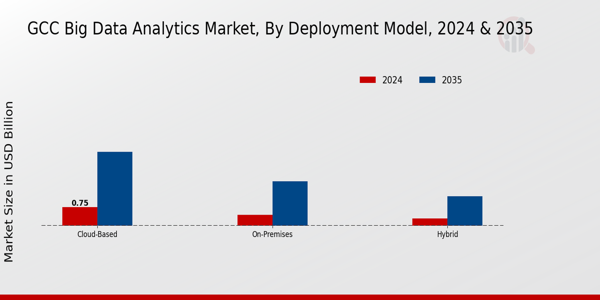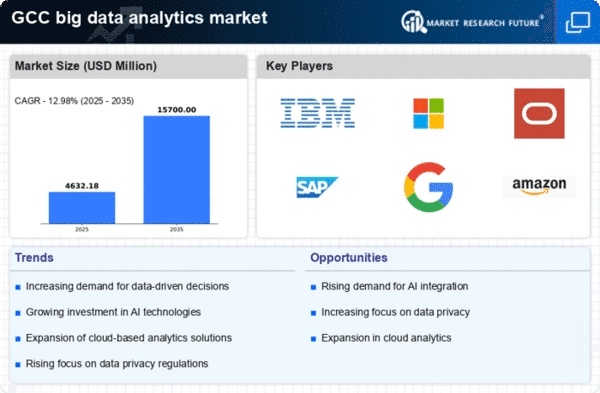GCC Big Data Analytics Market Segment Insights
Big Data Analytics Market Deployment Model Insights
The Deployment Model segment of the GCC Big Data Analytics Market has gained substantial attention due to the increasing need for organizations to harness vast amounts of data efficiently. The overall market is expected to experience significant growth as businesses undergo digital transformation and seek actionable insights from data analytics.
Among the various deployment models, the On-Premises approach remains significant for organizations prioritizing data security and compliance, especially in sectors such as finance and healthcare that operate under stringent regulatory frameworks.
This model allows firms to maintain complete control over their data environment and ensure higher performance for critical applications, which is a key driver for its adoption in the region. Cloud-Based solutions, on the other hand, have experienced a surge in popularity, driven by the need for scalability, flexibility, and cost-effectiveness.
As enterprises in the GCC embrace cloud technologies, they benefit from reduced capital expenditure, easy maintenance, and access to advanced analytics tools without the need for extensive infrastructure. This deployment model facilitates collaborative work and data accessibility across geographies, essential for multinational firms operating in diverse markets.
The Cloud-Based approach also supports a fast-paced business environment, allowing organizations to rapidly scale their analytics capabilities in response to market demands. Furthermore, the Hybrid model blends the best features of both On-Premises and Cloud-Based solutions, thus addressing the unique needs of different organizations.
It facilitates a customized approach, enabling businesses to retain sensitive data on-premises while leveraging the cloud for less critical operations. This model provides a strategic advantage, allowing for seamless integration of existing infrastructure with new cloud services, thereby optimizing resource utilization and enhancing operational efficiency.
Overall, the GCC Big Data Analytics Market benefits from these diverse Deployment Models as they cater to the various operational requirements of organizations across different sectors. Each model presents distinct advantages, and the increasing convergence of advanced analytics technologies is pushing companies to adopt a more tailored approach.
This trend reflects the dynamic nature of the GCC market environment as businesses strive for innovation and efficiency in their data utilization strategies. The continuous evolution of the regulatory landscape in the region also shapes preferences for specific deployment models, highlighting the importance of flexibility and compliance in the modern analytics era.

Source: Primary Research, Secondary Research, MRFR Database and Analyst Review
Big Data Analytics Market Type Insights
The GCC Big Data Analytics Market showcases a diverse range of Type segments that play crucial roles in shaping the industry’s landscape. Descriptive Analytics provides valuable insights by summarizing historical data, allowing businesses in the GCC region to understand trends and patterns effectively.
Predictive Analytics, on the other hand, is becoming increasingly significant due to its ability to forecast future outcomes based on existing data, enabling organizations to make informed decisions and streamline operations.
Meanwhile, Prescriptive Analytics stands out as a powerful tool, offering recommendations for actions to achieve desired outcomes, essential for businesses aiming to optimize strategies in competitive markets. Lastly, Diagnostic Analytics aids in identifying the causes of past events, which is critical for organizations looking to enhance performance and mitigate risks.
Overall, these analytics types present unique advantages and are central to leveraging data effectively, thus driving the growth and innovation of the GCC Big Data Analytics Market. As organizations throughout the GCC region continue to invest in advanced analytics capabilities, the demand for these specific analytics types is likely to expand, ensuring a robust evolution of market dynamics.
Big Data Analytics Market End Use Insights
The GCC Big Data Analytics Market is experiencing significant growth, driven by an increasing demand for data-driven decision-making across various industries. In the End Use segment, sectors such as Healthcare, Retail, Finance, Telecommunications, and Manufacturing are recognizing the value of big data analytics in enhancing operational efficiency and customer engagement.
The Healthcare sector is leveraging data analytics to improve patient outcomes and streamline operations, while Retail companies are utilizing consumer insights to shape marketing strategies and optimize inventory management. The Finance sector, on the other hand, is adopting advanced analytics for risk assessment and fraud detection, thereby safeguarding financial transactions.
Telecommunications firms are using big data to enhance network performance and customer experience, significantly influencing their competitive edge. Manufacturing is embracing analytics for predictive maintenance and supply chain optimization, ultimately minimizing costs and improving production efficiency.
Collectively, these segments contribute to the diverse applications and robust growth potential of the GCC Big Data Analytics Market, catering to the region's evolving business landscape and digital transformation efforts.As industries increasingly adopt data analytics solutions, they not only drive economic growth but also enhance their operational frameworks, creating an ecosystem rich with opportunities.
Big Data Analytics Market Technology Insights
The Technology segment of the GCC Big Data Analytics Market is critical for driving the region's digital transformation efforts. This segment includes various components such as Hadoop and Spark, both of which play a significant role in processing and analyzing large data sets efficiently.
Data Warehousing serves as a foundation for storing vast amounts of structured and unstructured data, enabling businesses to access and analyze their data for informed decision-making. Machine Learning has emerged as a vital tool in the technology landscape, providing predictive analytics capabilities that empower organizations to derive actionable insights from their data.
Similarly, Data Mining techniques allow for the extraction of useful patterns and trends from extensive data sets, enhancing strategic initiatives. The favorable government initiatives in the GCC region to promote technology adoption and innovation further bolster the importance of these technologies.
As organizations increasingly recognize the power of data, these components of the Technology segment continue to gain traction, ensuring that the GCC Big Data Analytics Market evolves and matures. Overall, the interplay of these technologies fosters enhanced operational efficiencies and supports the region's ambition to become a data-driven economy.


















